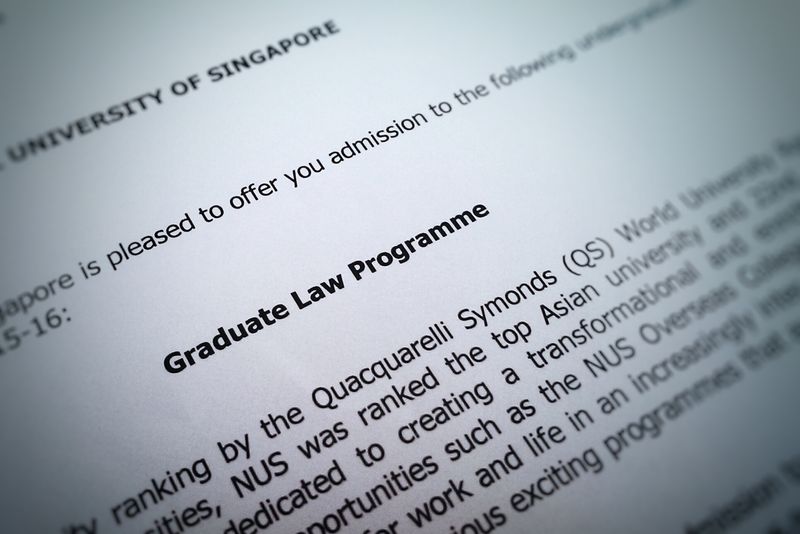The Graduate LL.B. Programme — a faculty perspective
To provide current students and prospective candidates with a more detailed picture of the Graduate LL.B. Programme (GLB), this is the first part of a Justified two-part series on the topic. Justified would like to express its appreciation to Assoc Prof Eleanor Wong, Vice Dean of Student Affairs, for giving a faculty member’s perspective.
An overview of the GLB
Prof Eleanor Wong: When the Approved Graduate Law Programme (AGP) was first started in the 1980s, it catered to civil servants who would join the legal service after completing the programme.
The Faculty re-instituted the 3-year AGP in AY 1998-99 and the programme’s “target audience” was expanded significantly, with a view to injecting multi-disciplinary talent into the legal profession. Candidates are no longer limited to civil servants.
The name ‘AGP’ was changed to the ‘Graduate LL.B.’ (GLB) from AY 2006-2007.
The selection process for GLB candidates looks at a wide range of qualities to identify strong candidates. Academic qualifications are important, as is the candidate’s performance in his/her previous profession as garnered from the curriculum vitae and referee reports. Work experience is not required. But where it exists, performance there, to the extent that is relevant to a candidate’s likely performance in law, is considered.
Justified: In previous years, the GLB students had at least one tutorial class together, so that they could gain social support from each other. This is no longer the case with the 2015 intake. What are your comments on this?
Prof: This practice was tried out for a few years. It had some pros and some cons, including the fact that, in the module in question, GLB and LLB students would be deprived of the benefit of each other’s views and perspectives. On balance, the faculty’s sense was that GLB students had opportunities to socialise outside of class if so desired and that within class, there were minimal pedagogical benefits, and possibly some pedagogical deficits, from segregating the GLB group.
Justified: How did the launch of the SMU Juris Doctor (JD) programme in 2009 affect the NUS GLB?
Prof: We have not seen any discernible impact. Interest in the NUS GLB has remained constant and very strong over the years.
Justified: Do NUS GLB students have any advantages over their SMU JD counterparts, or vice-versa?
Prof: My personal view is – not any more or less than the average NUS law student over the average SMU law student.
Justified: There have been suggestions to change the NUS GLB to award a Juris Doctor degree to underline the multidisciplinary appeal of such a graduate. Your views on this?
Prof: My own personal view is that titles are overrated. The substance is what counts. The NUS GLB programme effectively gives the same grounding and education as other degrees, with various names, where a person with a previous non-law degree undergoes sufficient legal learning to be considered qualified as a “law-trained” person. Some schools call that degree a JD, some call it a JM, we call it a GLB. Shakespeare would agree with me, I think.
Justified: How is the class of honours for GLB students calculated – is it compared to their entry cohort, or to the graduating cohort?
Prof: Class of honours is based on some pretty rad maths, which I won’t go into – variations depend not just on GLB vs LLB but also on whether one goes on exchange, whether one took a Leave of Absence, whether one is a DDP student, and other considerations. Suffice to say that the “top X%” part of the calculation is based on a weighted average mark and that the calculation is made at the point of graduation.
Justified: Do GLB students have any advantage over the undergraduates in the job market, and do GLB students seem to gravitate more towards certain fields of law?
Prof: I’m afraid we don’t have tracking devices on our graduates that would allow us to answer this question in a definite way. My own anecdotal experience in practice, as a person who has been involved in recruitment, is that a lot depends on the firm, its area of practice and what it is looking out for. And an equal amount depends on the individual candidate. To sum up: in my view, it comes down, as it usually does, to the individuals involved.
GLB personalities
Justified: Who was the most memorable GLB student, in your experience?
Prof: To be honest, I don’t think teachers purposely look out for distinctions between GLB and LLB students or keep track that way. I have had many memorable students, quite a few of whom are GLB students, I imagine. Several of our young faculty members are NUS GLB graduates, including Elaine Chew and Lynette Chua, whom I believe was the first GLB student to achieve a First Class Honours degree and who, when she was at school, was already quite memorable even though she had not yet begun her relationship with body tattoos (smiley face)).
In the second part of this series, Justified speaks to Chan Meiyi, a second-year GLB student. Meiyi was kindly volunteered for the interview by her GLB 2 classmates.
Written by: Lynn Chan (Year 1)







